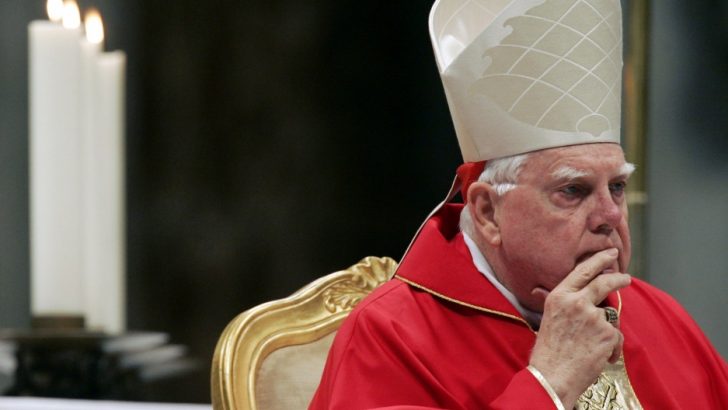State Papers
Echoes of the past from the archives
The annual release of files often reveal historical ironies in the private papers of the state that how perspectives on events and individuals in public life change constantly.
In the summer of 1989 Cardinal Bernard Law made a pilgrimage to Ireland to visit the shrines at Knock with a party of 100 from Boston. Though that was their main objective, the Cardinal also took the opportunity to visit the North with Dr Cathal Daly, then still Bishop of Down and Connor to guide him and to gain his own impressions of what was happening there from a nationalist point of view.
Bishop Daly had famously declared in the context of Irish affairs that “evil must be rejected totally and unequivocally. There must be no ambivalence, no double standards, no selective indignation.”
Cardinal Law, however, was photographed against a wall painting of three Provos with the legend ‘Our day will come’. This would have pleased many in Boston.
Influences
The Cardinal’s relationship with the Irish community in and around Boston was a shadowed one, as profiled by a diplomat ‘s note in a private memo. Boston Catholicism had been shaped and influenced by the long term of Cardinal Cushing. The appointment of Law and his Portuguese predecessor had been intended by Rome to break this Irish stranglehold on a prime American arch-diocese.
Law was appointed in 1984, but turned out (perhaps inevitably) to be favourable on the whole to the Irish-American community. This visit was therefore a significant one for him. He had, according to the diplomatic report “demonstrated a keen interest in Irish affairs and issues”.
In 2003 a further report by the Massachusetts attorney general said that over 1,000 children may have been molested”
He also took a strong line,” the diplomat continued, “and was conservative on many issues.” These were both foreign and domestic. Both homosexuality and freemasonry dismayed him.
Cardinal Law was entertained to a private dinner in Iveagh House with a roster of carefully selected guests by the Department. This, though private affair, was still a lavish example of State entertainment, as the items in the file indicates.
During his visit the Cardinal also gave an interview to the Irish Press. “Cardinal Law said that while he would not stress the proselytising [in Boston] it was a part of the picture and was causing concern. The vulnerability of Irish emigrants was often affected by the lack of a legal status of numbers of people entering the U.S. and these people could be very susceptible to a response which grew from another agenda.”
This concern for the moral and religious welfare of simple emigrants from Ireland had about it in the eyes of some an air of the 1920s, and did not reflect the real nature of the migrants from modern Ireland, who were better educated under a system that the Catholic Church itself had strongly influenced.
Split
He named in particular the Boston Church of Christ. This group, ‘the Boston Movement’, was a rapidly expanding entity that eventually split with the other worldwide Churches of Christ.
The group traced itself back to the ideas of religious reform of Alexander Campbell of Ballymena, who emigrated to the U.S. in 1809 and started there the “non-denomination church Movement”.
These concerns suggested that the Cardinal set for himself a high pastoral concern for his Catholic community.
Twenty years later, that perspective on the Cardinal’s moral concerns shifted completely.
On December 13, 2002 Cardinal Law offered resigned from his Boston see as the reverberations of the scope of the clerical abuse in Boston rang around his head. He moved to Rome, where he remained a figure of influence in some circles. But his downfall made others reflect on the warm welcome he received in Ireland in 1986.
In 2003 a further report by the Massachusetts attorney general said that over 1,000 children may have been molested by more than 250 priests and church workers from 1940 to 2000.
Yet another report said that some 6% of ordained priests, some 6,500, since 1950, had been accused of sexual abuses.
Cardinal Law said that while he would not stress the proselytising [in Boston] it was a part of the picture and was causing concern”
“I only wish that the knowledge that we have today had been available to us earlier,” Law wrote in 2001 in the Boston diocesan paper as the reports of abuse began to gain momentum.
That was far from the actual case. Back in 1985, the year after he had been feted in Ireland, a long expert authored report on sexually abusive priests was given to the National Conference of Catholic Bishops. Cardinal Law had urged that this independent study by experts should be undertaken.
The Church of Christ in Boston continues to grow. It is now established in Ireland.
NA file 2019/101/2245.


 Cardinal Bernard Law
Cardinal Bernard Law 